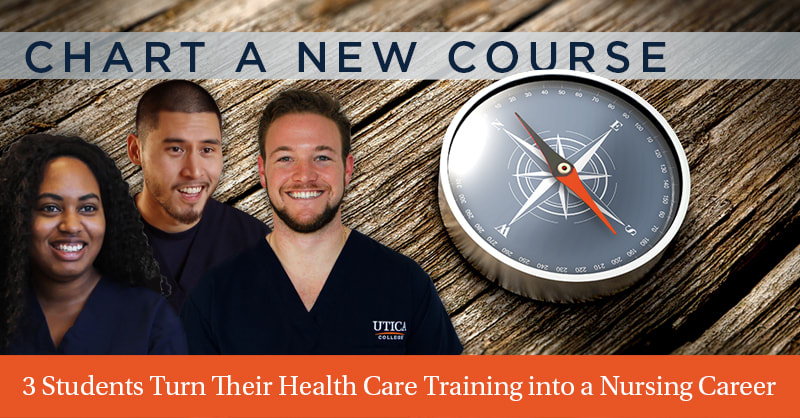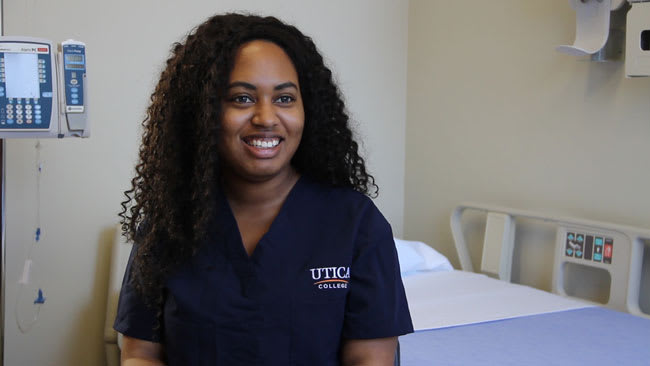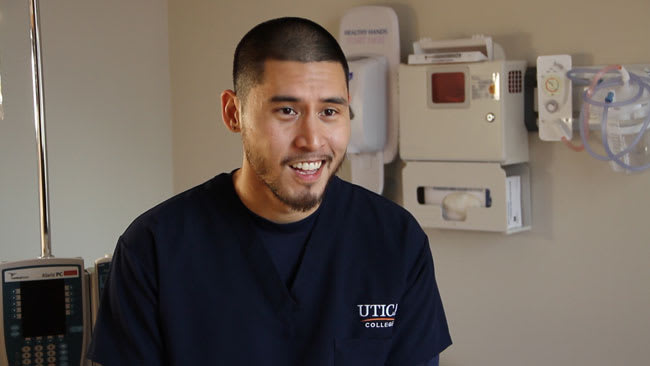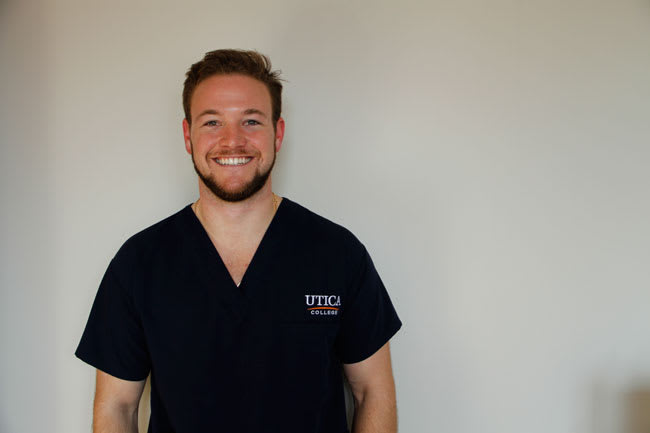New Paths: Change from Non-Nursing Degree to BS in Nursing
Each blog post is dated and contains accurate information as of that date. Certain information may have changed since the blog post publication date. If you would like to confirm the current accuracy of blog information, please visit our ABSN program overview page or contact us at (866) 892-6747.
Maybe you’re a Certified Nursing Assistant (CNA) or Patient Care Technician (PCT) who wants to transition to an RN job to develop deeper relationships with patients or to increase your salary potential. Or maybe your ultimate goal is to become a nurse practitioner or certified registered nurse anesthetist (CRNA) and a bachelor’s in nursing is the first step toward advancing your career to the next level.
No matter your reasons, a transition from a non-nursing degree to BS in Nursing can happen faster than you think. With Utica College’s ABSN program, you can earn your degree in as few as 16 months.
We talked to three Utica College students who enrolled in our program for many of the same reasons you may be considering making the transition to become a nurse. Read their stories to see how our ABSN program helped to accelerate their careers.

Dia L.’s Story: From Pharmacy Tech to Nursing Student
Dia received undergraduate degrees in biological anthropology and health science but worked as a pharmacy technician for the past five years. While she enjoyed the behind-the-scenes research aspect of her job, it was her desire to interact with patients that led to her to transition into a nursing career.
“I always really wanted to work with people, actually be the one that helps people when they’re going through something and to see the progression that people make,” she says.
Since she had already gone to school for four years, Dia says she felt a more accelerated path toward pursuing a Bachelor of Science in Nursing would be a better fit for her than a three- or four-year program. And because her ultimate career goal is to become a nurse practitioner, Utica College’s ABSN program stood out to her.
“(Many hospitals) want nurses to become more of a diploma profession, and I want to eventually go further in my nursing career,” she says.
First-Hand Learning

“Knowing that most of my clinicals would be at hospitals was very helpful to me because that’s where most nurses work and where you’re going to get a lot of experience and see first-hand the things that you’re learning,” she says.
The clinical component of her training, particularly the specialties, solidified in Dia’s mind that she made the right decision to pursue a B.S. in Nursing.
Because clinicals begin the first semester of Utica College’s ABSN program, students get valuable real-world experience working with patients from the start — something Dia highly values as she plots out her career path beyond nursing school.
“No matter how far you go in nursing, whether you go NP or get a doctorate in nursing, the focus is on caring about the patients and taking care of the patients,” she says.
Terence H.’s Story: CNA Pursuing an ABSN
Terence also has a professional background in healthcare. After graduating with a degree in biomedical science from the University of South Florida, he took a job working in a rehabilitation facility as a Certified Nursing Assistant (CNA).

After working this and other support staff roles in the healthcare industry, Terence wanted a more hands-on position, something that would allow him to have a deeper relationship with patients. So he decided to pursue a bachelor’s in nursing to transition into a career as an RN.
“Nurses have that ‘nursing touch,’ and that’s something I wanted to do rather than just making rounds — talking to people and having that bond with the patient and building a relationship with them,” he says. “Instead of telling the doctor, ‘put him on this, this and that,’ I’d rather be that face-to-face, first person they’d ask when they need something.”
He knew he wanted to pursue a Bachelor of Science in Nursing — “the quicker the better,” he says — because having that degree could provide him with more job opportunities than if he obtained an associate’s degree in nursing.
That combined with his accelerated timeline make it no surprise why Utica College’s ABSN program became his top choice for continuing his education.
Jumping Right In
Terence already had many of the prerequisites completed thanks to his degree. That meant he could jump right into the ABSN program after completing one additional course online. Because he still wanted to continue working through the program, the online theory-based component made it convenient for him to complete those courses rather than being on campus five days a week.
When it came time for clinicals, his previous on-the-job experience also gave him a leg up.
“I helped my classmates feel more comfortable because I was helping them at the same time (I was learning),” he says. “Having some type of hospital experience is definitely beneficial as far as getting into any kind of nursing or healthcare field.”
Terence graduates in December and aspires to work in an emergency room, pursue a career in travel nursing or work toward a masters or doctorate – which he says wouldn’t have been possible without the quality nursing training he received from Utica College’s ABSN program.
“I wasn’t thinking about it before but now it can be an option for me,” he says.
Logan L.’s Story: ABSN, a Path to Becoming a CRNA

Logan wasn’t quite sure how to turn his degrees in health services and health sciences into a career until his path turned toward nursing during an internship at the executive offices at Florida Hospital. There he shadowed several nurses and saw how the hospital trained nurses, all of whom told him about their passion for the profession.
“Every nurse I’ve ever met to this day I’ve asked them ‘Do you love your job?’ and they all say ‘I love it,’” he says. “So that’s good job security in the sense of not only having a job anywhere you move to, but you’ll be happy doing it.”
That experience, combined with a conversation with his father, a physician, solidified Logan’s decision to continue his education and work toward becoming a CRNA. The first step in that process requires completing a bachelor’s in nursing, something he was eager to finish quickly so he could reach his goal as soon as possible.
“One of the biggest reasons I picked Utica College was because it was certified and would help put me into the school I need,” he says.
A Natural Transition
Logan’s previous experiences in the healthcare industry made the transition into nursing school a natural one. Since he went on rounds with nurses during his internship, he says he better understood what to expect going into clinicals and was more excited than nervous to start them.
“Now I’m getting to the level where I can understand what’s going on when (a nurse) is treating a patient, why she’s giving him certain fluids and why they’re doing certain labs and only certain labs matter rather than just looking at everything,” he says.
With graduation from the ABSN program on the horizon, Logan plans to work as a cardiology nurse and in a hospital intensive care unit for a few years before applying to a CRNA program.
He credits his experience in Utica College’s ABSN program for putting him on the right path to pursue his dream profession.
Looking to transition your own current healthcare job or degree into a career in nursing? Contact us to learn more about how you can complete an ABSN at Utica College in as few as 16 months.

